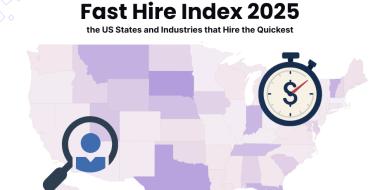Resume Objectives: Examples, Definition, and Tips
A compelling resume objective can be the difference between getting an interview and getting overlooked. In just 15 seconds—the average time recruiters spend on your resume—your objective statement needs to convey exactly why you're the right candidate for the position. Learn how to craft a powerful objective that grabs attention, showcases your value, and makes hiring managers want to know more about you.

This article will cover what a resume objective is when to include one, and how to write a strong objective statement. Plus, it’ll provide some examples to help you get started crafting your own resume objective.
What is a resume objective?
A resume objective is a concise sentence or two at the beginning of a resume that highlights your professional goals and how they align with the company’s mission. This brief introduction serves to capture the employer’s attention and set the tone for the rest of the document, providing a snapshot of your aspirations.
It serves as an explanation of why you want the job that you are applying for. Objective statements are usually placed at the top of your resume, just under your header which contains your name and contact information. Since this is where the HR specialists will look at first, it is crucial to include your skills and experiences that best alignes with the position you are applying for.
Use your resume objective to showcase your transferable skills and demonstrate why you are a good fit for the position.
When to include a resume objective
There are several instances where it specifically makes sense to include a resume objective over a different type of resume introduction (such as a resume summary):
No professional experience or education
If you have never worked full-time or don’t have any higher education, you can still write a compelling resume objective. Use this introduction to highlight your skills and traits that will make you a good fit for the job, and outline the value that you will provide for the employer.
Examples of a resume objective with no experience:
“Motivated self-starter looking to apply stellar organizational and communication skills in a corporate setting. Seeking an administrative position with ABC Corporation to assist with budget management, office organization, and streamlining processes.”
“Enthusiastic and dependable individual with a strong aptitude for customer service, seeking to apply excellent communication and problem-solving skills in a retail associate position.”
Student or recent graduate
If you are a student or recent graduate, chances are that you will not have much relevant professional experience to list on your resume. Use your resume objective to highlight your academic achievements and outline your career goals as you enter the professional world.
Examples of a student resume objective:
“Senior chemistry student at XYZ University (current GPA: 3.8) seeking to join ABC Laboratories as a research assistant. Looking to leverage strong research and lab management skills gained through internships at DEF and TUV Laboratories and volunteer experience on campus.”
“Recent business school graduate seeking a full-time position in finance where I can lend my knowledge of market analytics to help organizations improve profitability.”
Career change
It can be difficult to make it clear on your resume that you are looking to make a career change to a new industry. Fortunately, you can outline this in your resume objective and show employers that you have transferable skills.
Examples of a career change resume objective:
“Motivated retail associate with 2+ years experience at busy urban store looking to leverage strong work ethic and highly-rated customer service track record in a customer service representative position with XYZ Company.”
“Dedicated and experienced accounting professional with proven success managing finances for mid-sized commercial organizations.”
Relocating to a new area
It can be confusing for a potential employer to read on your resume that your current address is in Los Angeles, but you are applying for a position at their company in Las Vegas. If you are moving to a new area and applying for jobs there but do not yet have a new local address, make your intentions clear in your resume objective.
Examples of resume objective for someone relocating:
“Detail-oriented CPA currently in the process of relocating to Las Vegas. Looking to leverage 3+ years of experience and extensive knowledge of Quickbooks and other accounting programs in an accounts receivable position with ABC Company.”
“Experienced software developer relocating to San Francisco in August, seeking to apply five-plus years of expertise in full-stack development to innovative projects at XYZ Tech.”
Seeking advancement in your industry
You can also use your resume objective to make it clear that while you do not have experience with the exact position you are applying for, you have industry experience and are looking to advance your career.
Examples of resume objective for seeking advancement:
“Passionate educator with 15 years experience teaching K-12, seeking to leverage leadership skills and school system expertise to serve as principal at JFK School. Eager to serve the community and generate positive change.”
“Results-driven sales associated with over seven years in the retail sector, aspiring to leverage team leadership and strategic planning skills in a managerial role.”
When not to include a resume objective
If you have at least some experience in your industry and none of the above situations apply to you, you’ll likely want to use a resume summary rather than a resume objective. A resume summary concisely explains your current or most recent job title, your skills and achievements, and your relevant experience. As the name suggests, it essentially summarizes all the information on your resume in a couple of sentences. This makes it easy for hiring managers to see right away that you are a good fit for the position you are applying for.
Generally speaking, if there’s something you want potential employers to know about you but you aren’t sure how to make it clear through your work experience and education sections, use a resume objective as an explanation. Otherwise, opt for a resume summary for your introduction.
How to write a resume objective
Here are some tips for how to write a successful resume objective:
1. Keep it short
Most hiring managers are only going to spend about 7 seconds looking at your resume, so by keeping your resume objective short and to the point, you can catch their attention to make them stop and read the rest of your resume. Your resume objective does not have to be written in complete sentences - you can remove filler words like ‘a,’ ‘the,’ and ‘of’ and use powerful phrases over long, flowery sentences to get your point across.
2. Tailor it to each position
Tailor your resume objective to each position that you apply for. Always mention the exact position title and the company name in your resume objective, and use keywords and phrases to help your resume pass applicant tracking system (ATS) scans.
Expert Tip:
3. Start with your strongest traits and skills
If the job description has a laundry list of desired skills and abilities, don’t try to cram them all into your resume objective. Pick a few of your strongest and most relevant traits and mention those, then work the rest into the remaining sections of your resume.
4. Mention your experience, education, and/or certifications
While you can go into more detail about your experience, education, and certifications later in your resume, you can briefly mention them in your resume objective. Remember, if the hiring manager only spends 7 seconds reading your resume, you want to make sure that it is impressive enough to pique their interest in that short period of time.
Mentioning these things in your resume objective can be especially valuable if the job description asks for a certain number of years of experience or a specific level of education. And, if you are a student or recent graduate, most of your accomplishments will likely be academic in nature, so it makes sense to touch on them throughout your resume.
5. Describe your career goals
Finally, the main purpose of your resume objective is to outline your career goals and professional ambitions. Make it clear to potential employers how your goals align with the position at their company and that hiring you would be mutually beneficial.
Stick to short-term professional goals - there’s no need to outline your entire life plan in your resume objective.
6. Customize the resume objective
All of the resume objective examples outlined here have one important thing in common: they avoid generic language.
Make sure you tailor an objective on resumes to the specific job and company by incorporating relevant keywords from the job description. When you customize an objective for resumes, you show that you’ve done your homework and increase your odds of passing applicant tracking systems (ATS).
For instance, a marketing role might include the keyword “social media management” in the job description. You should try to weave such terms into your resume objective if you have the relevant background experience.
7. Perfect your structure and content
The structure and substance of your resume objective need to be as close to perfect as you can get them. An effective resume objective typically includes the following components:
- Who you are
- What you offer
- Your career goals
For example:
“Motivated marketing graduate with experience in social media management looking to leverage content creation skills to increase online presence at XYZ company.”
Industry-based resume objective examples
If you need some inspiration for a well-crafted resume objective, you check out the resume examples prepared for each profession on Jobseeker. Now, let's look at some of those resume objectives for various industries:
Administration resume objective
“Analytical problem-solver seeking administrative position with ABC Company to assist with improving the workflow and efficiency of the office. Possess two years of experience working in an office setting, looking to leverage a detail-oriented mindset and strong work ethic.”
Food service resume objective
“Friendly, attentive individual who thrives in a fast-paced environment, seeking an entry-level position with XYZ Restaurant. Experienced with customer service and basic food preparation.”
Construction/general labor resume objective
“Reliable general laborer with experience in entry-level construction, job site cleanup, and basic math seeking a position with ABC Construction. Looking to leverage the ability to lift and carry heavy objects, physical stamina, and strong work ethic to gain steady employment with opportunities for eventual growth.”
Software engineer resume objective
“Recent graduate with BS in Software Engineering from XYZ University (GPA: 3.9) seeks position with ABC Software. Looking to apply experience gained from an internship with XYZ Development, critical thinking skills, and design ability to create software that exceeds customer expectations.”
Cashier resume objective
“Honor student at XYZ High School (current GPA: 3.8) seeks cashier position with LMN Grocery that allows me to use my customer service and concessions experience to provide positive, efficient experiences for all customers.”
How to write the best resume objective?
Tips to optimize your resume objective
- Start with your professional identity and years of experience: "Certified Project Manager with 8+ years leading cross-functional teams" immediately establishes credibility before you even mention your goals.
- Include one specific, measurable achievement: "Marketing specialist who increased client conversion rates by 37% through targeted social campaigns" shows proven impact rather than just claiming skills.
- Mirror the exact language from the job description: If they want a "detail-oriented data analyst," explicitly use those words to help pass automated screening systems and signal you're exactly what they're looking for.
- Name-drop relevant technology or methodology expertise: "Financial analyst proficient in Bloomberg Terminal and discounted cash flow modeling" shows you're ready to contribute from day one with minimal training.
- End with a "value proposition" statement: "Seeking to leverage my expertise in supply chain optimization to reduce your operational costs while improving fulfillment speed" tells employers what they'll gain by hiring you.
Mistakes to avoid in your resume objective
- Writing a self-centered objective: "Looking for a position that offers growth opportunities and competitive salary" focuses on what you want rather than what you'll contribute to the employer.
- Using vague, meaningless buzzwords: "Dynamic professional seeking to utilize transferable skills in a challenging environment" says absolutely nothing about your actual qualifications.
- Creating a one-size-fits-all objective: Using the same generic statement for every application signals to employers you're mass-applying rather than genuinely interested in their specific role.
- Mentioning outdated or irrelevant skills: Leading with expertise in systems or methods no longer used in your industry suggests you haven't kept your knowledge current.
- Making it too long: Anything over 2-3 lines forces recruiters to wade through text to find your qualifications, and they'll likely skip it entirely instead.
The Bottom Line: Make Your Resume Objective Work For You
Your resume objective isn't just the first thing employers see—it's your chance to make them want to read the rest of your resume. Think of it as your professional headline that answers the crucial question: "Why should we interview this person?"
By avoiding common mistakes and implementing the powerful tips above, you'll transform your objective from a forgettable formality into a compelling introduction that opens doors. Remember, a well-crafted objective statement doesn't just tell employers what job you want—it shows them the specific value you'll bring to their organization from day one.
Take the time to customize this critical element for each position you apply for. Those extra few minutes could be the difference between your resume landing in the interview pile or the rejection folder.
Need help crafting the perfect resume? Check out Jobseeker’s professional resume and cover letter creation tool to generate a powerful resume objective based on your profile. You can enter all of your information and then switch between layouts, styles, fonts, and so forth with just a few clicks. Then download your resume instantly and get started applying for your dream job right away!
Impress potential employers with your resume
Follow step-by-step professional guidance to create a polished resume in minutes.



